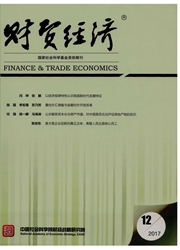

 中文摘要:
中文摘要:
出口企业的特征会影响其遭遇反倾销诉讼吗?本文通过整理汇总中国工业企业数据库、全球反倾销数据库以及中国海关数据库2000—2006年的数据,利用Logit和Probit模型,考察了中国出口企业频繁遭遇美国反倾销的原因。研究结果表明,在考察期内,企业的资本密集度越高,其遭受反倾销的可能性越大。国有企业和多产品企业更有可能遭遏反倾销。企业劳动生产率和企业规模均会显著影响其遭遇反倾销的概率,不过,企业劳动生产率和企业规模与企业遭受反倾销的概率之间并不表现为单调关系。具体来说,当企业规模较小时,企业劳动生产率越高,越容易遭受反倾销;而当企业劳动生产率较低时,随着企业规模扩大,其遭受反倾销的可能性也越高。此外,企业经营持续时间越长,其遭受反倾销的可能性越低,然而这一影响并不显著。本文的研究对于重新认识我国频繁遭遇反倾销的缘由,具有重要的现实意义。
 英文摘要:
英文摘要:
Do the characteristics of the export enterprise affect its anti-dumping investigation? In this paper, we investigate reasons that Chinese export enterprises frequently suffered anti-dumping of the United States by summarizing China industrial enterprises database, Global anti-dumping database and China customs database from 2000 to 2006 and using Logit and Probit models. The results show that the higher capital intensity the company owns, the more likely it is to suffer anti-dumping investigations. The state-owned enterprises and multi-product enterprises are more likely to suffer anti-dumping investigations. The labor productivity of enterprises and the firm scale significantly influence the probability for enterprises to he investigated. However, the relationship between labor productivity of enterprises, firm scale and the probability of enterprises suffered anti-dumping investigation is not monotonic. Specifically, when the firm scale is small, the higher labor productivity the enterprise has, the more probability of suffering anti-dumping the enterprise will have. When the labor productivity is in a low level, with the expansion of the scale of the enterprise, it is more likely to suffer anti-dumping investigations. In addition, the longer duration of business operation the enterprise has, the less probability of anti-dumping investigation the enterprises will suffer, but this effect is not significant. The paper is important to rethink why our country are frequently encountering anti-dumping investigations.
 同期刊论文项目
同期刊论文项目
 同项目期刊论文
同项目期刊论文
 期刊信息
期刊信息
